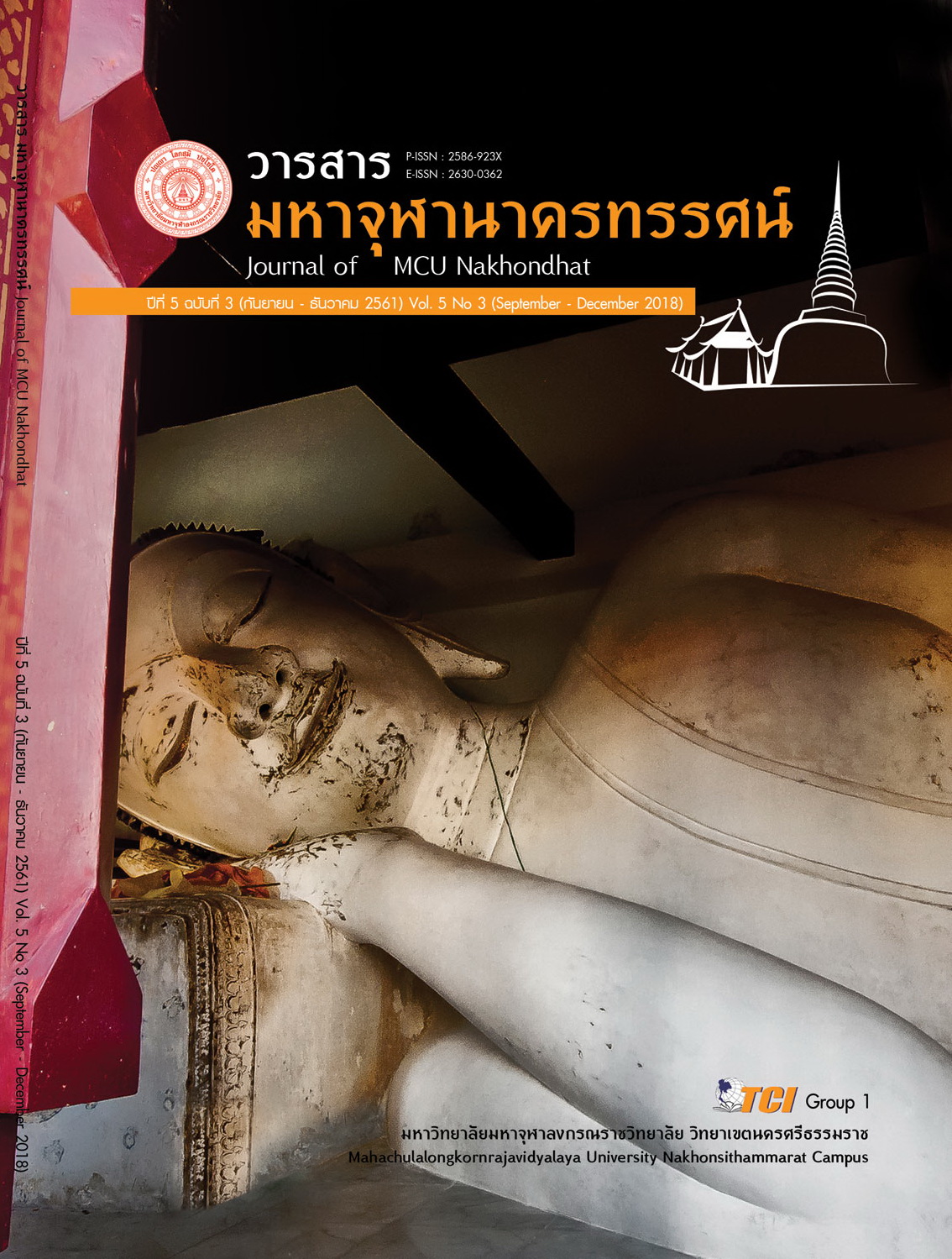THE GUILDINE TO BUILD UP VIRTUE MORALITY FOR THE CHILDREN SINCE IN WOMB.
Main Article Content
Abstract
The article was a part of the research entitled the Comparative Analysis of Prenatal Development between Buddhist and Obstetrical Views. The article aimed at presenting the development of human mind and the guildline to build up virtue morality for the children since in womb. This article employs documentary research and In-depth interview.
The results show that man consists of body and mind (consciousness). For the interpretation of human genesis at the embryo stage, Kalala is the embryo during the implantation stage in Obstetrics. Fetus begins to experience six senses mind (consciousness), touch, sight, hearing, smell and taste from the surroundings, emotions, memories and dreams since in womb. Virtue morality can be developed in children since the fetal stage with the guideline P3-P3-P3 (PPP3) which means the three Periods of time, the three Performances and the three Puñña-kiriyā-vatthu. To elaborate, the three performance factors are parental physical healthcare, psychology (attitudes) and childrearing practice. These should all be observed in the three periods of time, namely: pre-pregnancy, prenatal and postnatal. Parents should take care of themselves and their children in terms of physical health and psychological well-being. Children also learn from their parents the way to value and prioritize things in life by practicing or performing the three bases of meritorious action, the three Puñña-kiriyā-vatthu: Charitable giving (dāna), Morality (sīla) and Meditation (bhāvanā).
Article Details
References
คณะแพทยศาสตร์ โรงพยาบาลรามาธิบดี. (2558). พัฒนาการทางจิตใจ สืบค้นเมื่อ 28 มิถุนายน. 2561. เข้าถึงได้จาก https://med.mahidol.ac.th/ramamental/generalknowledge/child/0624 2014-1920
จำลอง ดิษยวณิช, ศ.นพ. (2541). พุทธศาสนาและจิตเวชศาสตร์. วารสารสมาคมจิตแพทย์แห่งประเทศไทย, 43(3), 266-291.
บรรจบ บรรณรุจิ, ผศ. ร.ท. ดร. (2561). ภาควิชาภาษาตะวันออก จุฬาลงกรณ์มหาวิทยาลัย. สัมภาษณ์ 2 กุมภาพันธ์. กรุงเทพมหานคร: โรงพิมพ์มหาจุฬาลงกรณราชวิทยาลัย.
พระมหาสมบูรณ์ วุฑฺฒิกโร, ดร. (2561). คณบดีบัณฑิตวิทยาลัย มหาวิทยาลัยมหาจุฬาลงกรณราชวิทยาลัย. สัมภาษณ์ : 18 กุมภาพันธ์.
มหาจุฬาลงกรณราชวิทยาลัย. (2539). ฏีกาภาษาบาลี ฉบับมหาจุฬาปกรณ์วิเสโส. กรุงเทพมหานคร: โรงพิมพ์วิญญาณ.
มหาจุฬาลงกรณราชวิทยาลัย. (2539). พระไตรปิฎกภาษาไทย ฉบับมหาจุฬาลงกรณราชวิทยาลัย. กรุงเทพมหานคร: โรงพิมพ์มหาจุฬาลงกรณราชวิทยาลัย.
ลำพู โกศัลวิทย์, ผศ. พญ. (2561). ภาพประกอบการบรรยายรายวิชา มธ ๑๐๒ หลักพัฒนาตนเองและสุขภาพ เรื่อง Self-introspection. มหาวิทยาลัยธรรมศาสตร์.
ศูนย์เรียนรู้สุขภาวะ สำนักงานกองทุนสนับสนุนการสร้างเสริมสุขภาพ. (2560). ทำงานเป็นสุขด้วยสติสมาธิ. กรุงเทพมหานคร: SOOK PUBLISHING.
สตีเฟน ฮวน. (2551). มหัศจรรย์แห่งร่างกาย (The Odd Body). เล่ม 1. แปลและเรียบเรียงโดย โรจนา นาเจริญ. กรุงเทพมหานคร: สำนักพิมพ์มติชน.
สำนักงานกองทุนสนับสนุนการสร้างเสริมสุขภาพ. (8 พฤษภาคม 2557). “อารมณ์” ปัจจัยก่อโรคที่ไม่ควรมองข้าม. สืบค้นเมื่อ 10 มิถุนายน 2561. เข้าถึงได้จาก https://www.thaihealth.or.th/ Content/24207-“อารมณ์”%20ปัจจัยก่อโรคที่ไม่ควรมองข้าม.html
เสถียรธรรมสถาน. (2017). จิตประภัสสรตั้งแต่นอนอยู่ในครรภ์. สืบค้นเมื่อ 28 มิถุนายน 2561. เข้าถึงได้จาก https://www.sdsweb.org [2 ต.ค. 2560]
Blomfield, Adrian. (27 May 2009). 'Feral' child barks and hisses after being raised as a pet. Telegraph Retrieved August 4, 2018. เข้าถึงได้จาก https://www.telegraph .co.uk/news/newstopics/howaboutthat/5393378/Feral-child-barks-and-his ses-after-bei ng-raised-as-a-pet.html
Chamberlain David B. (2014). The Sentient Prenate: What Every Parent Should Know. Journal of Prenatal & Perinatal Psychology & Health, 28(4), 253-274.
Chan, Ka Po. (2016). Perceptions and experiences of pregnant Chinese women in Hong Kong on prenatal meditation: A qualitative study. Journal of Nursing Education and Practice, 6(3), 135–146.
Muthukrishnan, Shobitha, et al. (2016). Effect of Mindfulness Meditation on Perceived Stress Scores and Autonomic Function Tests of Pregnant Indian Women. Journal of clinical and diagnostic research, 10(4), CC05– CC08.
Sadler, T.W. (2012). Langman's Medical Embryology, 12th ed. Philadelphia: Lippincott Williams & Wilkins.
Sriboonpimsuay, Wanlapa. (2011). Meditation for Preterm Birth Prevention: A Randomized Controlled Trial in Udonthani. Thailand International Journal of Public Health Research, 1(1), 31-39.
Vieten C., Astin J. (2008). Effects of a mindfulness-based intervention during pregnancy on prenatal stress and mood: Results of a pilot study. Archives of Women's Mental Health, 11(1), 67–74.


